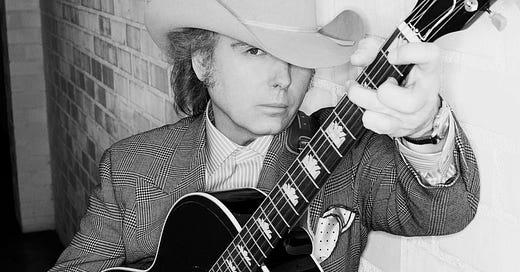Nearly 40 years after the release of his first album, Dwight Yoakam has entered the distinguished statesman chapter of his legendary career. Now an Americana Music Association Lifetime Achievement Award recipient and something like a diplomat for the Californian country tradition he helped bring back to life, Yoakam is an icon of counter-cultural cool whose story may seem fully written. But the new album, Brighter Days, shows a trailblazer with plenty of fuel left in the creative tank.
Featuring 14 fresh tracks – all but three co-written and each produced by Yoakam himself – the set helps bring his long-cherished Bakersfield sound into the present tense and ends up looking farther ahead. At 68, Yoakam is far from retired – and if he has anything to say about it, California country isn’t done either.
To be sure, few have done as much to carry the mantle of California’s country contribution as Yoakam. Few have embodied its spirit better, standing boldly and defiantly apart from the mainstream for so long. And all of it despite Midwestern roots.
Born in Eastern Kentucky and raised in Columbus, Ohio, Yoakam burst on to the country scene in the mid ‘80s – but only after a failed bid in Nashville and relocation to LA, which welcomed his peculiar mix of honky-tonk, bluegrass, and punk influence.
Tapping into the electrified, against-the-grain ethos of all-but-forgotten artists like Wynn Stewart and Buck Owens, the success of 1986’s Guitars, Cadillacs, Etc., Etc. almost singlehandedly reconnected country to the hard twang embraced in Bakersfield. At the time, the mainstream had once again come under the regional sway of the Southeast (a force which remains in place today, despite artists like Jon Pardi), and the charts were dominated by glorified soft-rock acts like Alabama.
Yoakam stood as the cowboy-hatted, steely-eyed antithesis of that, reminding fans California existed in the country-music culture and adding diversity to an increasingly uniform genre. And though he’s remembered now as a stylistic outlier, the star found considerable success.
Put together, Yoakam produced five Platinum or multi-Platinum albums (including the 3X Platinum This Time in ‘93), two Number One singles, more than a dozen Top 10s, and two GRAMMYs – all while defining a unique Cali-country aesthetic and reviving the high-lonesome yodel. He’s carried on in dedication as the format evolves, even naming his previous most recent album Swimmin’ Pools, Movie Stars… in reference to classic images of Californian prosperity. With Brighter Days, that instinctual mix of style, substance and West Coast idealism remains sharp. Marking his first album in nine years, it shows an innovator still making California country look cool and lighting the path ahead for those to come.
The biggest evidence of that is likely the album’s superstar collab, “I Don’t Know How To Say Goodbye (Bang Bang Boom Boom)” – a swaggering two-step duet with genre-crossing hit maker Post Malone. Like Yoakam, Posty was born elsewhere (Central New York), had his family uprooted (to Texas), and found his creative footing in LA. And, like Yoakam, the hip-hop star has an honest affinity for old-school country.
Capturing the swirling energy of a neon-lit honky-tonk dance floor, “I Don’t Know How To Say Goodbye (Bang Bang Boom Boom)” is a joyful example of the upbeat but broken-down style that Bakersfield pioneered. It would have felt right at home in the Buck Owens repertoire. It’s also proof that the classic form can still be engaging, and it’s been well received, too – much like Post Malone’s F-1 Trillion country debut, which embodies some of the California-country spirit, if not its style. But the track is not the only Golden State high point found on Brighter Days.
From the fuzzed-out first chords of “Wide Open Heart,” Yoakam embraces his adopted home. That album opener feels like a surf-rock throwback, made to be the soundtrack of a convertible cruise down the 101. “I’ll Pay the Price” follows, echoing with the heartbroken twang of a Crystal Palace classic.
Elsewhere, tracks like “California Sky” are more direct. A tale of lost love turning forever-blue skies dark, Yoakam contrasts a bright and breezy melody with the jangling Laurel Canyon flair.
“Can’t Be Wrong” sizzles with the frantic energy of Yoakam’s cowpunk roots, and while “A Dream That Never Ends” is laced with the warm, harmonic fuzz of a sunshine rocker, Yoakam recasts the Carter Family classic, “Keep On the Sunny Side,” as a euphoric mantra for the American dream.
He ends the set on a syncopated boogie called “Every Night” – yet another masterclass of too-easy Sunset Strip charisma – but the project’s title track shouldn’t be ignored, either. With a strutting shuffle beat, slippery steel guitar runs and a rich, melancholy twang, Yoakam laments an unkept promise of “Brighter Days” in love – but holds out hope that the lie comes true.
Maybe we should look at California country in similar terms. It may feel faded at the moment, but Yoakam already revived it once. Brighter days could still be ahead.
Lead Image: Dwight Yoakam via United Talent Agency.






